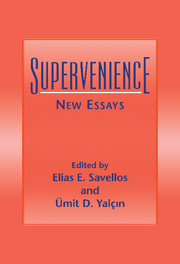Book contents
- Frontmatter
- Contents
- List of Contributors
- Introduction
- Varieties of Supervenience
- Supervenience: Model Theory of Metaphysics?
- “Global” Supervenient Determination: Too Permissive?
- Weak Supervenience Supervenes
- The Tweedledum and Tweedledee of Supervenience
- Reduction in the Mind of God
- Psychophysical Supervenience, Dependency, and Reduction
- Supervenience Redux
- Nonreducible Supervenient Causation
- Physicalism, Supervenience, and Dependence
- An Argument for Strong Supervenience
- Arguments for Supervenience and Physical Realization
- Supervenience and the Essences of Events
- How Does Ontology Supervene on What There Is?
- Supervenience and Intentionality
- Supervenience, Coherence, and Trustworthiness
- Does Truth Supervene on Evidence?
- Index
Nonreducible Supervenient Causation
Published online by Cambridge University Press: 29 March 2010
- Frontmatter
- Contents
- List of Contributors
- Introduction
- Varieties of Supervenience
- Supervenience: Model Theory of Metaphysics?
- “Global” Supervenient Determination: Too Permissive?
- Weak Supervenience Supervenes
- The Tweedledum and Tweedledee of Supervenience
- Reduction in the Mind of God
- Psychophysical Supervenience, Dependency, and Reduction
- Supervenience Redux
- Nonreducible Supervenient Causation
- Physicalism, Supervenience, and Dependence
- An Argument for Strong Supervenience
- Arguments for Supervenience and Physical Realization
- Supervenience and the Essences of Events
- How Does Ontology Supervene on What There Is?
- Supervenience and Intentionality
- Supervenience, Coherence, and Trustworthiness
- Does Truth Supervene on Evidence?
- Index
Summary
Philosophical literature is rich with attempts to identify the different species of the supervenience relation, to work out the logical relations among the different species, and to determine the causal efficacy of supervenient properties. I will here confine my investigation to what has been called strong supervenience. There seem to exist two species of this type of supervenience: local (or mereological) and global. One can illustrate the difference by considering two cases. (i) Many materialists will probably be committed to the view that if an individual of this world and its twin in some possible world differ in some psychological way at a given moment, then these two individuals must also differ in some physical way at that moment. In being so committed, these materialists will be viewing psychological properties as being locally (and strongly) supervenient on physical properties. (ii) A philosopher might think that it is impossible for two individuals, say Oscar and Twinoscar, to have distinct psychological properties at some moment (say, one believes that something is water, and the other believes that it is twater) and yet for the worlds they inhabit, including their own bodily constitution, to be physically identical at that moment. Such a philosopher would be expressing the view that psychological properties are globally (and strongly) supervenient on the physical.
- Type
- Chapter
- Information
- SupervenienceNew Essays, pp. 169 - 186Publisher: Cambridge University PressPrint publication year: 1995



